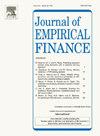预测风险溢价:一个基于约束的模型
IF 2.4
2区 经济学
Q2 BUSINESS, FINANCE
引用次数: 0
摘要
本研究引入了一种新的基于约束的模型框架来预测风险溢价,彻底检查了文献中现有模型的机制和局限性,并利用了先进的机器学习技术。所提出的框架有效地捕获了依赖于政权的预测特征。它结合了预测回归、“朴素”历史平均模型和零值模型的信息内容,显著降低了单变量和多变量预测的模型不确定性和参数不稳定性。实证分析证明了我们的策略在样本外预测性能方面优于各种竞争模型和不同市场条件下的优势,突出了我们结果的稳健性。我们进一步证实了将市场制度视为经济状态变量的有效性,并证明了我们基于约束的模型在阐明提高可预测性的来源方面的合理性。我们的研究对金融和经济研究以及投资组合管理和风险评估的实际应用具有重要意义。本文章由计算机程序翻译,如有差异,请以英文原文为准。
Predicting risk premiums: A constraint-based model
This research introduces a novel constraint-based model framework for predicting risk premiums, thoroughly examining the mechanism and limitations of existing models in the literature and leveraging advanced machine learning techniques. The proposed framework effectively captures the regime-dependent forecasting characteristics. It incorporates the information content of predictive regression, “naive” historical average model, and zero value model, significantly reducing model uncertainty and parameter instability across univariate and multivariate predictions. Empirical analysis demonstrates the superiority of our strategy in terms of out-of-sample forecasting performance over a variety of competing models and under different market conditions, highlighting the robustness of our results. We further substantiate the validity of considering the market regime as an economic state variable and justify the rationality of our constraint-based model in elucidating the source of the improved predictability. Our study holds significant implications for financial and economic research, as well as practical applications in portfolio management and risk assessment.
求助全文
通过发布文献求助,成功后即可免费获取论文全文。
去求助
来源期刊

Journal of Empirical Finance
Multiple-
CiteScore
3.40
自引率
3.80%
发文量
59
期刊介绍:
The Journal of Empirical Finance is a financial economics journal whose aim is to publish high quality articles in empirical finance. Empirical finance is interpreted broadly to include any type of empirical work in financial economics, financial econometrics, and also theoretical work with clear empirical implications, even when there is no empirical analysis. The Journal welcomes articles in all fields of finance, such as asset pricing, corporate finance, financial econometrics, banking, international finance, microstructure, behavioural finance, etc. The Editorial Team is willing to take risks on innovative research, controversial papers, and unusual approaches. We are also particularly interested in work produced by young scholars. The composition of the editorial board reflects such goals.
 求助内容:
求助内容: 应助结果提醒方式:
应助结果提醒方式:


